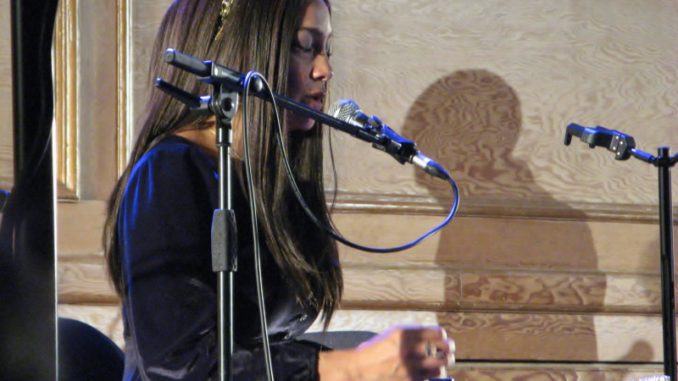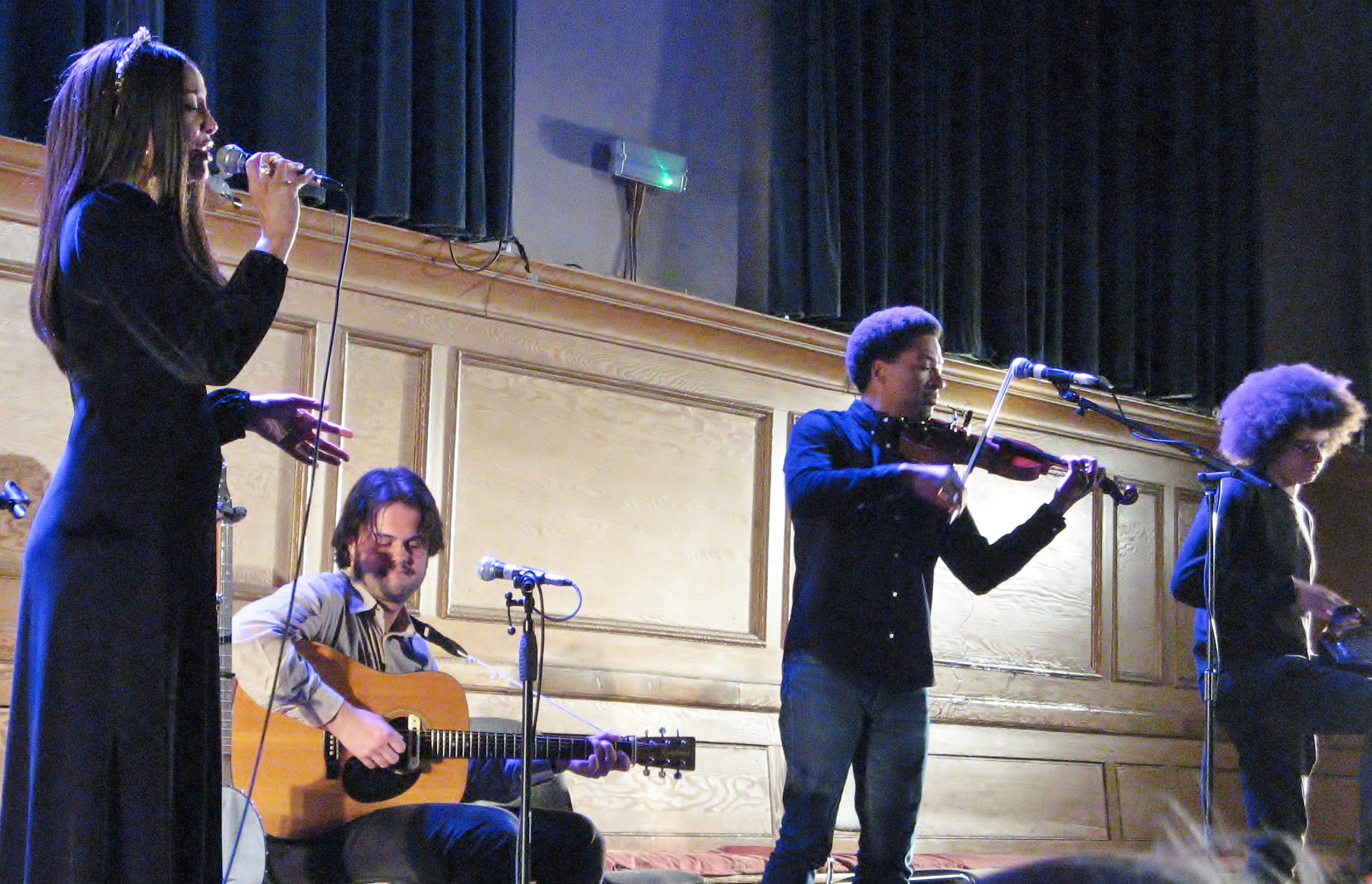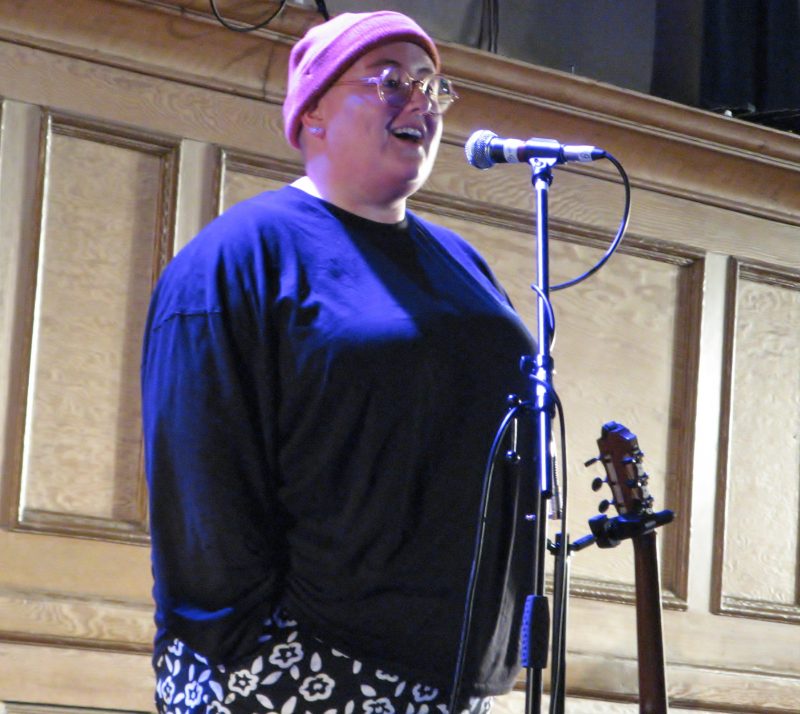
Cecil Sharp House on an Autumnal evening was the place to be to witness a major folk talent emerging. That’s a big claim, but 2022 has surely been Angeline Morrison’s year with first the album ‘The Brown Girl and other folk songs‘ and more recently the major work that is ‘The Sorrow Songs: Folk Songs of Black British Experience.‘ Not that Angeline Morrison has quite come from nowhere – she is a morris dancer, and a singer who took inspiration from a youthful hearing of Shirley Collins on the radio: which of course makes the home of the EFDSS a perfect venue. In fact the EFDSS had provided her with a grant to help fund the research of the history and the available songs of Black experience – there were few if any of these – allowing her to, as she remarked, restore “Black History back into the folk songs of this country.”
Angeline Morrison has previously dipped her toe into a variety of different musical genres – but these two albums signal a commitment to her folk roots. ‘The Sorrow Songs‘ is an album of reimagined balladry – with familiar feeling tunes with very new lyrics telling the stories of Black British experience going back not as far as is historically possible but still some hundreds of years. These stories have all been researched by Angeline Morrison who is at pains, as the evening progresses, to distinguish every fact from every imaginative extrapolation. It’s not at all dry – it is educative but the introductions ground the songs in reality adding to their impact. Opening the evening she strums her autoharp and sings of an ‘Unknown African Boy‘, imaging a mother’s grief at the loss of her child whose fate was to be shipwrecked off the Isles of Scilly and drowned and recorded, nameless, as part of the washed up cargo. It’s a full band rendition with Clarke Camilleri (of the Good Time Brothers), adding guitar and harmony vocals, Hamilton Gross (of Head North) on fiddle and Cohen Braithwaite-Kilcoyne (of Granny’s Attic) on concertina.
Morrison also shines a light on stories that are, on reflection, positive – strange as that may appear. ‘Black John‘ liltingly tells of the first Black Welsh horticulturist – a child brought to Wales in the eighteenth century as either a purchased slave or a gift who would grow to be “proud Welsh man Jac Ddu” – a famed gardener, a married man and father, content, despite his early experiences about which he says “I cannot help but call to mind the torments that befell me.” The complexities of the relationships between what are, on the face of it, power imbalances is further explored in the almost vaudevillian ‘The Beautiful Spotted Black Boy‘ which has Camilleri and Gross depart the stage crying out “Roll Up” before Morrison regales the audience with an invitation to a freak show “Roll up and see my beautiful spotted black boy! / He’s a charming creature / … / He’s just like a sweet Dalmatian pup / And for a small fee, you can see his pied face.” So far so offensive – but the song progresses to be a discourse between the two, with the child regretting having been bought and sold whilst the purchaser – and exhibitor – professes a deep affection for the child “I fear they’d never understand / I fear they’d think me strange or wild / I could not care more for this infant so pure / If he were my own, my own dear child.” It’s perhaps the most daring song in the set with it’s intertwined layers of emotion and the over-arching wrongness of the original situation. Although ‘The Hand Of Fanny Johnson‘ also fares well in those stakes with the really far too jolly sounding story of an Eighteenth century serving woman whom the family were so sad to part with on her death that they removed, mummified and hung on the wall one of her hands so that she’d always be with them in part at least. It bounces along quite unreasonably with the sing-a-long-able chorus of “When you bury my body down, down in the cold, cold ground / Won’t you bury me, bury me entire and whole?” Angeline Morrison has said that she hopes that her songs might escape into the wider folk repertoire, and bizarrely this may well be the most likely to do so – it even has a clapping game to accompany that almost early Steeleye Span-ish chorus.

‘Mad Haired Moll O’Bedlam‘ borrows its tune from the well known ‘Bedlam Boys‘ but questions whether Moll is really mad or a victim of injustice for defending herself against sexual assault. It’s the song, Morrison informs us, that is the most fictionalised, being based on a photograph and scanty information that the woman pictured was incarcerated for speaking back to a policeman. It’s a powerful song for that – and shows that Morrison’s imagination should be a guide for her song writing as every event she sings of rings true.
As the stories embedded in the songs start to touch on more recent history the emphasis moves subtly to difference in treatment – whether it is the slaves turned to soldiers in the American War of Independence tricked into joining up because “England is ruled by an African queen / Dark and esteemed on the throne” and with the unfulfilled promise of “freedom and home” or the down-playing of Mary Seacole’s nursing activites in the Crimera in favour of the better known exploits of pie-chart aficionado Florence Nightingale. The Liverpool riots of 1919 where dockers attacked lower paid Black workers – lower paid only because the employers could get away with doing that – is vivdly depicted in all its murderous violence. ‘Go Home‘ further vividly paints the daily implicit threat of racism – a threat that like this song is not rooted solely in history, the protagonist could be living a hundred years ago or today, who can tell?
The set closes out with another of the master and slave redemptive stories – ‘Slave No More‘ – where a Cornish miner working in South America offers his slave freedom either to remain in South America or travel “home” to Cornwall as a servant. He chooses the latter and when the older man falls ill nurses “him with a brother’s care, with love did him surround“, and the pair are eventually reunited in a common grave. There’s an unsung subtext here.
The night closed out, after a standing ovation for Angeline Morrison and the band, with a rendition of Ewan McColl’s ‘The Colour Bar Strike‘ which strikes a positive note as railwaymen who don’t want to work with a non-white employee are told that the Union won’t support them because the whole point of a Union is that everyone should be treated fairly. It’s very far from McColl’s gruff vocals, with Angeline Morrison adding a vocal grace that had been present all evening. It’s not often that someone just seemingly stands up and announces that they are a major artist on the folk scene – but that is what happened on October 20th 2022 at Cecil Sharp House. These are songs that are really important – but they are also really good, beautifully sung and played and free of simple answers and uncomplicated situations: rich and fulfilling and also worth hearing.
Opener Maddie Morris’ songs can be sometimes humorous as in ‘The Housewives Lament‘ or her conversion of ‘Haul-Away‘ into a shanty about how much she hated her job. But the 2019 winner of the BBC Young Folk award also has a serious side – such as her retelling of the story of Philomela emphasizing how she is literally left without a voice after her rapist cuts out her tongue and that even when the gods protect her by turning her into a nightingale it is noteworthy that “the female nightingale is mute – only the male one sings.” Her short set closed with ‘Marsha P Johnson‘ a tribute to a hero and an admission of struggling, of being worn down, by a steady tide of micro-aggressions and homophobia. It’s a set that was warmly received in Cecil Sharp House – that’s a wooly-jumpered finger in the ear folk audience for you after all.



